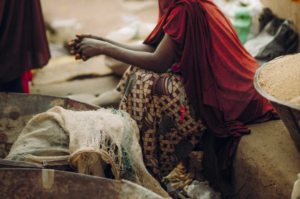
The King’s Palace, Igboho, Oyo State, Nigeria, 1554.
Orompotoniyun was dreaming about her father, Ofinran, when she heard someone call her name from somewhere outside her dreamscape. She awakened to find a servant standing at the foot of her bed, dressed in her uniform of a red Adire cloth tied around her breasts and another tied around her waist. Three lines of beads ran just below her belly button. Orompotoniyun struggled to stamp down the tides of anger that banked on the shores of her mind and failed. The glare she directed at the girl could cut her into pieces.
“What have I said about waking me from sleep? Is the palace on fire?”
The girl curtsied as she babbled. Finally, she gave up and fell to her knees, head bowed. She had long, thick hair, and Orompotoniyun’s jealousy mixed with her ire.
“Say what you came to say and pray it is important enough or your punishment will be severe. Even the Alaafin will not be able to save you from me,” Orompotoniyun said.
“Please, my Princess. I beg your forgiveness. I was sent to request your presence in the throne room. A great tragedy has happened.”
Orompotoniyun’s mind raced to her brother, frail and sickly in his bed the last time she saw him. A strange disease had taken over his body, followed him from the last village he visited. There had been many whispers of a fair-skinned lady that Egugunoju had not been able to stop chasing as if he was an ant with sugar. The threads of anger loosened around her heart and regret took its place. She remembered his kindness to her, especially during their long journey from Oyo-Ile, how he had constantly watched out for her.
Gathering her strength, she stood from the bed and let her covering fall. Her breasts were bare, and she had only a piece of cloth tied around her waist. She always slept with it. She had learned long ago that the secret that lay between her legs must not be shared with anyone. If someone saw, they would be horrified. They would run screaming from her room, call on the chiefs, who would call on Egungunoju, who would then ask Ajimobi what he should do. The rest of the chiefs would look on, helpless to do nothing but watch as Ajimobi whispered his heart’s desires into the king’s ears. If she was lucky, she would be banished, cast onto another village, and left at their mercy. If she was fortunate, word of what they saw would not get out.
She waved the servant away. The girl would err another day. Everyone knew how short Orompotoniyun’s temper was. Orompotoniyun walked to the box that lay in the corner of the room and bent to look for an outfit. The girl, eager to please, sprung from her knees where she had been shaking like a leaf in the wind and ran to her.
“Let me assist you, Princess,” her head still bowed.
Orompotoniyun sighed and raised her head. The palace servants were useless. This one did not know to let her mourn before she had to go outside to face the chiefs.
“Go,” she said sharply. “I will take care of myself.”
She tied a colorful wrapper around her breasts, tight enough that it would not slip and shame her, and loose enough that it would not cut off her blood circulation. Two short, three medium, and five long beads adorned her neck and fell to her breasts. Blood red to signify her royal status. She wore four beads on each wrist and three on each ankle. Her feet were bare as was the custom. She would have loved to do away with the beads, but she was a princess, and this was not the time to show weakness.
When she walked into the throne room, the chiefs had already assembled. Their heads were downcast. She did not need anyone to confirm her fears.
Orompotoniyun was sure most of the chiefs were scheming. Her brother had borne no sons, only daughters from both of his wives. Abike and Alari had given birth to two daughters each, and although she loved them, they could not do much good at a time like this.
One of the chiefs, as fat as a pig, was the most suspicious. All the advice he had given Egugunoju was dubious. As king, her brother should not have stepped out of the palace grounds as frequently as he did. Ajimobi was the one who fanned the flames of her brother’s curiosity. It was well known that Ajimobi’s family had a trace of royal blood; his sons bragged about it everywhere they went. She injected strength she didn’t feel into her voice.
“Thank you for coming, chiefs. We appreciate your presence. May this bad thing never happen again.”
“Ashe.” They all chorused. One of them cleared his throat before the others had finished saying amen to her prayer.
“Princess Orompotoniyun, we must act fast. Alaafin Egugunoju did not have any sons. We must quickly make arrangements for the next king.”
Orompotoniyun laughed, in spite of herself. The man did not disappoint.
“My brother died this morning o, Chief Ajimobi. The Ogboni have not even come for his body. You are not asking how we will bury him. You are not even asking how he died. Instead, you are asking how we will pick the next king. Have you no shame?”
Ajimobi spluttered, looking around at his fellow chiefs for assistance as he tried to explain himself. No one else spoke up.
“But Princess, everyone knows that the king was sick. Should we then be surprised if a sick person dies?”
Orompotoniyun felt her heart drop into her stomach. She eyed the man’s shiny agbada, the pointed edge of his cap, and his bulbous eyes. She wished she had enough power to throw him into prison for his careless words.
“How wicked. If you were not such a revered chief, I would think you conspired to kill the king.”
The man jumped to his feet, shouting words of affront, threatening retribution. None of the chiefs said a word or even looked in his direction. Finally, he calmed and said, “Even the gods know I would never do that.”
“Yes. What choice have I but to believe you,” said Orompotoniyun. “We must start the burial rites. Has anybody informed the Ogboni of his death?”
“Of course. It was the first thing we did,” the Iyalode said, looking at Orompotoniyun as if she had dealt her a great insult.
They were starting to get restless. Each of them had their own plan since there was no royal man to ascend the crown. Her father, Alaafin Ofinran, as great a king as he had been, had only fathered one male child – Egugunoju. Her brother had not been able to concentrate long enough to father a legitimate male child, preferring to spend his time visiting new villages, seeking new findings under women’s skirts. A shame, indeed.
“Let us assemble tomorrow and discuss the matter of a new king. I will be here to welcome the Ogboni when they come for my brother.” The chiefs looked at her as if she had grown two heads.
“You should not even be in the room when we discuss it. Have you forgotten, Princess, that you are a woman? You should be thinking instead of how to find a husband,” Chief Ajimobi said.
“I will be there, Chief Ajimobi, because this matter concerns me as well. It concerns the entire town. You can either allow me into the meeting or the entire town will be present. It is your choice. Or is it not the next leader of this town you will be discussing?”
Chief Ajimobi smiled. “No one will show up, Princess Orompotoniyun, because the villagers know that it is against the tradition of our people.”
“The villagers also know that you plan to install one of your sons as king. Have you forgotten the atrocities your sons have committed? How they father children with women they later abandon? How they wait by the river and attack young men? The villagers will never let your useless sons spoil the Oyo that Egungunoju built. The gods especially will never let it happen.”
Ajimobi puffed like a dead goat. “How dare you spit such lies about my sons?”
Orompotoniyun laughed. “Lies? Shall we ask the people in this room if it is lies I speak? Shall we go out to the people and ask?”
The Iyalode was the first to acknowledge defeat and stand. “We will assemble tomorrow. Goodbye, Princess.” The woman did not bow her head as was customary before she walked to the exit, lifted the mat that served as the door, and stepped out. The others followed.
Orompotoniyun wanted to go back to her room, curl up on her pallet, and cry. Instead, she sat in the room decorated with statues of the gods and pondered about what to do. She could not allow Ajimobi to turn her home into his playing ground. She had to figure out a plan before the next meeting. For now, she needed to see her brother.
He was laid on a low pallet, dressed in his favorite agbada and beads with a knitted cap on his head. The room was bare, the mud walls shone as much as they could, and the etchings on the walls mourned with her, their mouths downturned.
Her brother looked sick, even after death had taken him. His hands were crossed on his stomach and if one were to look from afar, they would think the man was merely sleeping. She didn’t touch him. Instead, she leaned on a wall close to where he lay and spoke to him.
She hailed him first, with the praise common to her people. Halfway through, her tears began to fall. She had retained the conviction that he would recover from the illness that plagued him. He had traveled to a neighboring village and returned sick the last time. For the first few moons, his sickness had gone unnoticed. Out of the blue, he started to suffer afflictions: a high fever, a cough which would not stop, a swelling of his groin. When it looked like the priest was finally curing him, he began to dry up as fast as fire raging through a forest. In the weeks before he died, he started to regain his energy. She had thought Egugunoju was too strong to die easily. Orompotoniyun had started to regain hope.
“Why did you die?” She whispered. She didn’t dare shout. Over and over, she whispered the question. Finally, fatigue settled in her bones. She walked to his side and kneeled close to his face. She bent low and kissed his forehead. “Goodbye, my brother,” she whispered. A sense of peace took over her body as if her brother’s spirit had spread a blanket on her back. She stood back up and looked at her brother with eyes that were clear of tears. She scanned her brother’s face, the beads, the grand agbada, his peaceful face, and she immediately knew what she had to do.
“No one must know.” Her mother had told her of her secret, long ago when she was just a girl. She remembered the story her mother had told of her birth, how the midwife’s face had turned ashen when she saw what was between the child’s legs. Her mother had acted quickly, slashing the woman’s neck then accusing her of trying to kill the baby. Jealousy, her mother had said. Everyone knew the midwife had labored five times with no children of her own. And was it a coincidence that so many children died at her hands? After, no one had been allowed to touch the Princess except her mother.
Orompotoniyun had just burst into the corridor that led to the throne room when a servant spotted her and fell to his knees, head bowed. He wore only trousers made from dull brown Aso Oke, as did every other male servant who worked in the palace. “My Princess, the Ogboni is here.”
She was surprised it had taken them so long. She looked up at the servant, thankful that she had left the room when she did.
“Lead the way.”
The Ogboni waited in the throne room, preferring to sit on the mat covered floor than to sit on the stools. They did not wear regular clothes. Instead, they tied plain white wrappers around their waists. Eight of them had come even though they only needed four to carry Egungunoju. One of them, the man who appeared to be their leader cleared his throat and spoke first.
“Princess, the chiefs have informed us of the things that happened here today. We cannot bury the Alaafin without picking a successor. The new king has to eat the old king’s heart according to the tradition of our people. We will send two of our members to be part of the meeting tomorrow to make sure that all goes as it should. Please show us where the king rests.”
Orompotoniyun’s body seized at his words. The Ogboni would only make her plan harder to execute. Better to knock them down one after the other. But an image of her father dealing with a similar situation came to her mind. He preferred to gather all his enemies in one place. She gestured behind her to the servant who had escorted her. “He will take you. I have things to attend to.” She bowed her head. “Please don’t be offended, my fathers.”
They all stood from their places on the ground, dusted off their outfits, and followed the servant into the room. If they were surprised when they re-entered with her brother’s body and saw her standing where they left her, they did not show it. She stepped out of the way and bowed to them as the men who carried the dead king struggled not to collapse under his weight. When she was sure that they would not come back, she made her way to her room, promising instant death to anyone who disturbed her. She stayed up all day and slept little at night. Her mind played a million and one scenarios, all the ways that things could go wrong.
The next morning, the chiefs arrived with the rising of the sun. With shaky hands, a young servant raised the flap that served as the door to her room to inform her that the chiefs awaited her presence. The girl met Orompotoniyun fully dressed. She adjusted her clothes and stepped out to join them.
“Good morning, chiefs, the Ogboni,” she greeted. When they saw her, many of them jumped to their feet, shouting exclamations, and wondering what was going on.
At some point in the night, Orompotoniyun had visited the Alaafin’s room and borrowed some of his clothes. She had taken great care to deck herself in the Agbada that was customary for a king and the trousers that went with it. She had draped herself in her beads to show that she was a full-blooded member of the royal family. She had also shaved her head and covered it with one of the white caps the Alaafin wore in the palace.
Chief Ajimobi, as she had expected, was the first one to speak. “Orompotoniyun, what is this? How dare you disrespect the crown by putting on the Alaafin’s clothes?” He had insulted her by omitting her title and he knew it. She knew he only wanted to court her anger. She smiled. The Ogboni had not moved nor been shaken from their spot.
“My chiefs, you said we need a new king.” She stepped forward, pushed her chest out, and raised her chin. “Here I am, the offspring of the great Alaafin Ofinran, and a sibling to the great Egugunoju. I present myself as your new king. I promise to do justice during my reign and take Oyo to great heights.” Her voice did not shake and for that, she was proud.
“Oti o!” The chiefs shouted. “Never! A woman! A woman who urinates from the back. We will never accept it! We will not!” They all began to shout at the same time, causing a commotion in the palace. Orompotoniyun sighed. Her legs were shaking beneath her robes.
One of the members of the Ogboni stood up and the chiefs immediately quieted down. Orompotoniyun recognized him as the one who had spoken to her the day before. He walked up to her and stood at face level. He smiled as if he was about to play a hand he knew would win him the game. “Princess,” he began. His voice was clear, but his voice was oily. She felt as if the word reached out and slapped her. “Only a man can rule Oyo. Are you a man?”
Orompotoniyun kept her face straight. “What makes a man?” She asked.
“Men do not have breasts, Princess. Men also have a manhood. Show us yours and you will be king.” The man said with a soft smile that didn’t reach his eyes.
“Select a woman here to follow me to private quarters and I will prove it to you. Or do you want to further disrespect me in front of all these people?”
The man smiled like he knew he had her in a corner. “If you become king, you will disrobe in front of a far larger number of people during your initiation. You may as well start now.” A sharp frisson of hatred speared through her body. She wanted to claw his face with her fingernails and watch that smile fall off his face.
She took her time, relishing the process. She removed her beads and gingerly placed them on the throne. She removed her agbada and stood up straight. Her nipples stood out of her chest from small mounds of flesh. She had never been happier about her almost nonexistent breasts. She untied the rope that held her trousers up. Settling her eyes on the man who had issued the challenge, she let down her trousers.
She saw his eyes go wide and saw the veins on his temple swell to almost bursting. She heard Chief Ajimobi sputter and search for words that would not come. There, at the juncture between her hips, sat a penis. It was tiny, but it was there. It fell forward and covered the small gash that was her vagina.
She looked at their faces again, and this time, she was the one smiling. They tried to talk, but the words refused to pass their throats. “Well?” Orompotoniyun prompted.
Ajimobi shouted first. The Iyalode fainted, clutching her neck beads as she fell. “Grab her quickly, and throw her into the dungeon before anyone else sees,” Ajimobi screamed.
“How? What is this?” the Ogboni man muttered to himself. Chief Ajimobi leapt forward as if to grab Orompotoniyun but the Ogboni man stopped him. “What are you doing? There between her legs is proof that she is your king.”
“No! How can that be? This is a woman. Have you forgotten so quickly?”
The Ogboni man did not answer. He looked up at the ceiling for many moments. His Adam’s apple bobbed as he swallowed. He met Orompotoniyun’s eyes and then, she saw something slide into place. Once he gave in, the others followed. They all fell to their knees one by one, bending until their heads touched the ground. Ajimobi looked around as if he was taken over by madness. She watched him slowly absorb the sight of his defeat. She watched him succumb, saw the fire die in his eyes. He joined the others on the ground and together, they drew the necessary words out around throats that refused to yield.
“All hail the king!”










Spirit October 06, 2021 09:17
Wow. My first role as king : Slice Ajimobi's greedy throat and suck his blood. Show they enemies negative love.